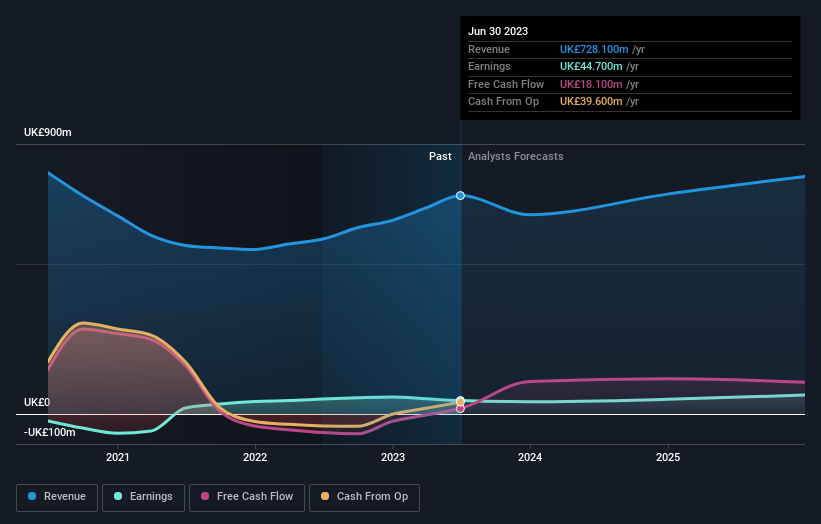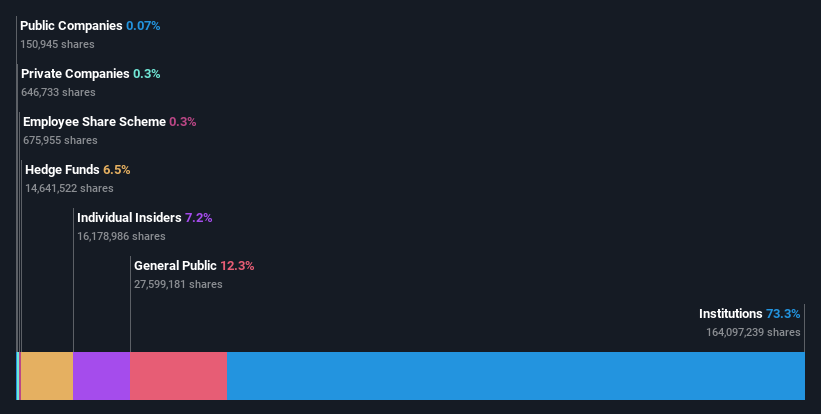Key Insights
Significantly high institutional ownership implies International Personal Finance’s stock price is sensitive to their trading actions
A total of 6 investors have a majority stake in the company with 56% ownership
Insiders have been buying lately
A look at the shareholders of International Personal Finance plc (LON:IPF) can tell us which group is most powerful. And the group that holds the biggest piece of the pie are institutions with 73% ownership. Put another way, the group faces the maximum upside potential (or downside risk).
Since institutional have access to huge amounts of capital, their market moves tend to receive a lot of scrutiny by retail or individual investors. As a result, a sizeable amount of institutional money invested in a firm is generally viewed as a positive attribute.
Let’s take a closer look to see what the different types of shareholders can tell us about International Personal Finance.
Check out our latest analysis for International Personal Finance
What Does The Institutional Ownership Tell Us About International Personal Finance?
Institutional investors commonly compare their own returns to the returns of a commonly followed index. So they generally do consider buying larger companies that are included in the relevant benchmark index.
International Personal Finance already has institutions on the share registry. Indeed, they own a respectable stake in the company. This implies the analysts working for those institutions have looked at the stock and they like it. But just like anyone else, they could be wrong. When multiple institutions own a stock, there’s always a risk that they are in a ‘crowded trade’. When such a trade goes wrong, multiple parties may compete to sell stock fast. This risk is higher in a company without a history of growth. You can see International Personal Finance’s historic earnings and revenue below, but keep in mind there’s always more to the story.

Investors should note that institutions actually own more than half the company, so they can collectively wield significant power. It would appear that 6.5% of International Personal Finance shares are controlled by hedge funds. That’s interesting, because hedge funds can be quite active and activist. Many look for medium term catalysts that will drive the share price higher. Our data shows that Aberforth Partners LLP is the largest shareholder with 17% of shares outstanding. With 10% and 9.4% of the shares outstanding respectively, abrdn plc and Schroder Investment Management Limited are the second and third largest shareholders. Furthermore, CEO Gerard Ryan is the owner of 0.7% of the company’s shares.
We also observed that the top 6 shareholders account for more than half of the share register, with a few smaller shareholders to balance the interests of the larger ones to a certain extent.
Researching institutional ownership is a good way to gauge and filter a stock’s expected performance. The same can be achieved by studying analyst sentiments. There are a reasonable number of analysts covering the stock, so it might be useful to find out their aggregate view on the future.
Insider Ownership Of International Personal Finance
The definition of an insider can differ slightly between different countries, but members of the board of directors always count. Company management run the business, but the CEO will answer to the board, even if he or she is a member of it.
I generally consider insider ownership to be a good thing. However, on some occasions it makes it more difficult for other shareholders to hold the board accountable for decisions.
We can report that insiders do own shares in International Personal Finance plc. It has a market capitalization of just UK£269m, and insiders have UK£19m worth of shares, in their own names. It is good to see some investment by insiders, but it might be worth checking if those insiders have been buying.
General Public Ownership
With a 12% ownership, the general public, mostly comprising of individual investors, have some degree of sway over International Personal Finance. While this group can’t necessarily call the shots, it can certainly have a real influence on how the company is run.
Next Steps:
While it is well worth considering the different groups that own a company, there are other factors that are even more important. To that end, you should learn about the 2 warning signs we’ve spotted with International Personal Finance (including 1 which can’t be ignored) .
Ultimately the future is most important. You can access this free report on analyst forecasts for the company.
NB: Figures in this article are calculated using data from the last twelve months, which refer to the 12-month period ending on the last date of the month the financial statement is dated. This may not be consistent with full year annual report figures.
Have feedback on this article? Concerned about the content? Get in touch with us directly. Alternatively, email editorial-team (at) simplywallst.com.
This article by Simply Wall St is general in nature. We provide commentary based on historical data and analyst forecasts only using an unbiased methodology and our articles are not intended to be financial advice. It does not constitute a recommendation to buy or sell any stock, and does not take account of your objectives, or your financial situation. We aim to bring you long-term focused analysis driven by fundamental data. Note that our analysis may not factor in the latest price-sensitive company announcements or qualitative material. Simply Wall St has no position in any stocks mentioned.
Credit: Source link




